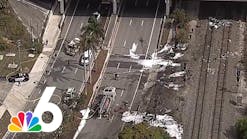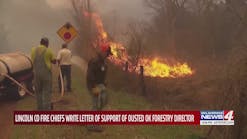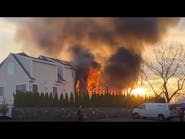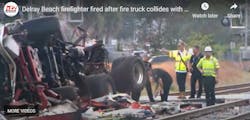As the flames drew closer, the fire chief called and called for help. But three other major wildfires were burning in Stevens County, Wash., and no one was left to respond.
Whipped by 40- to 50-mph winds, the new blaze on the Spokane Reservation sent up a column of smoke as it churned north toward a rural community of about 2,000 people east of the Columbia River.
The only thing that stood in the way: Stevens County Fire District 2 Chief Rick Anderson and his crew of volunteers.
For almost 24 hours, Anderson and 11 other firefighters fought the blaze alone, with pickup trucks carrying 300-gallon water tanks.
It was a costly and deeply personal battle waged on home turf, with two firefighters battling to save their parents’ home, another defending his in-laws’ house, and another losing 120 acres of timber to the flames.
Anderson watched the flames cross a road named for his grandfather and counted even more personal losses.
The fire near Fruitland started Friday night and remained out of control Tuesday afternoon, threatening houses. It also threatened to add to the mounting toll of destruction from one of Washington's worst wildfire summers in recent memory -- one so severe that firefighting crews across the West have hit their limits as they battle fire after fire for days on end, only to see more blazes erupt.
"Typically, when we have this number of fires, we can draw on folks around the nation," said Koshare Eagle, a spokeswoman for the Northwest Coordination Center in Portland, which oversees firefighting efforts in Washington and Oregon.
The problem, Eagle said Tuesday, is that "the other geographic regions are also trying to draw on folks around the nation."
Anderson was about to learn how bad things were.
First, he called surrounding fire agencies for help. They were already overwhelmed by other wildfires.
"Nobody came," he said.
Next, he called the county.
"Nobody came," said Anderson, 60, who has been a firefighter in Stevens County since he was 18 and also works as a communications specialist for the sheriff's office.
Then he called the Washington Department of Natural Resources.
"They had nobody to come help us," he said.
Finally, Anderson called state emergency management, asking that Washington state declare a mobilization to provide support for the fire.
The good news: "That was immediately granted."
The bad news: "There was nobody to send me."
One firefighter from a neighboring district broke away from a different blaze to help – giving Anderson a crew of 11 instead of 10. But that was it.
“He got nothing," said Stevens County Fire District 1 Chief Mike Bucy. "Even my district, we already had units out on other fires."
The Carpenter Road fire was just a few thousand acres, much smaller than several other blazes that have ripped through the region and sucked up the available personnel.
But the name itself symbolizes how personal the fire is for Anderson.
“Carpenter is my granddad. The road was named after my granddad. This fire is right where I grew up," he said. “We looked and said, what homes do we think we can save? Which ones were salvageable?”
Never before in Anderson’s four-decade career had he been forced to make such a choice.
“There was a group of homes we had to walk away from," he said. "I’ve never had to make that decision, 'We’re not going to do anything.'
"It isn’t like the newscasts,” he said. “It’s the Smith household. It’s the Jones household. … The houses all have names on them.”
Many homes had to be abandoned and, in all, 15 burned down over the weekend.
One resident, Larry Lehrbas, returned to his homestead to save some equipment, but he had some kind of medical emergency, Anderson said.
Then the fire blew over the only access road to Lehrbas' house, and it took hours for emergency workers to reach him, Anderson said.
Lehrbas was dead.
"His parents babysat me," Anderson recalled. "I bought my first cow from him."
Anderson's fire crew did manage to save a couple homes, including at a Bible camp where they evacuated about 200 children and their chaperones. "But that was it," he said.
A grateful community has embraced the firefighters, however, with offers of food and water from everyone who recognized their small yet titanic struggle.
“I was driving down the fire line yesterday and somebody handed me a box full of pizza," Anderson marveled. "It’s 45 miles from the nearest pizza shop!
“It’s been amazing, the kind of support we’ve gotten from our local community," he added.
Although the fire continues to burn, at least reinforcements have arrived: about 80 firefighters.
Anderson betrayed no hard feelings about the lack of help early on.
“Angry? Absolutely not. Disappointed? No," he said. “It’s just the way it was.”
———
©2015 the Los Angeles Times
Visit the Los Angeles Times at www.latimes.com
Distributed by Tribune Content Agency, LLC.





